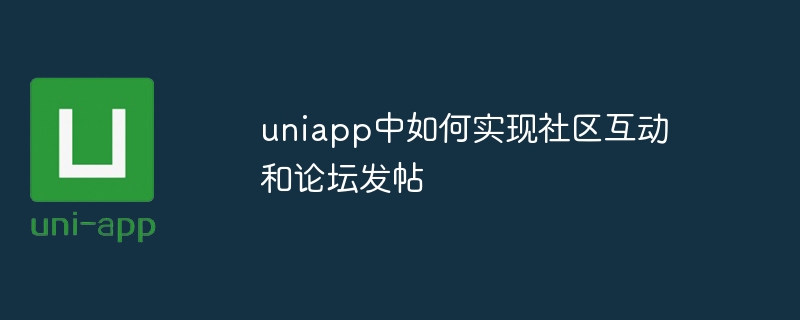

How to realize community interaction and forum posting in uniapp
In recent years, with the development of mobile Internet, community interaction and forum communication have attracted more and more attention and need. In response to this demand, uniapp, as a cross-platform development framework, provides a simple and efficient way to help developers realize community interaction and forum posting functions.
uniapp is a framework based on Vue.js, which can use Vue.js's syntax and components to build applications. Through various components and APIs provided by uniapp, developers can easily implement community interaction and forum posting functions.
First, we need to create a uniapp project and initialize some necessary files and components. In the uniapp project, we can use uni-ui or custom components to build the interface. For community interaction and forum posting functions, we can consider using uni-app’s component library and custom components to implement them.
Next, we need to design a suitable data structure to store information related to community interactions and forum posts. You can use a cloud database to store data, or you can use local storage or a back-end server to store data. No matter which method you choose, you need to design the table structure of the data and define the corresponding API interface.
For the community interaction function, we can use the list component provided by uniapp to display the list of posts in the community, and users can browse and comment on the posts. On the post details page, users can view the detailed content and comments of the post, and can reply and like. By monitoring user operations, we can send corresponding API requests to implement data addition, deletion, modification and query operations.
For the forum posting function, we can design a form page where users can enter information such as title, content, and submit a posting request. After submitting the request, we can store the post information into the database through the API and return the corresponding results to the user. Users can see their posts in the forum list.
The following is a simple code example that shows how to implement community interaction and forum posting functions in uniapp:
Through the above steps, it is very simple to implement community interaction and forum posting functions in uniapp. Developers can optimize and expand the code accordingly based on actual needs and business logic. At the same time, uniapp also provides other rich components and functions, which developers can choose and use according to actual needs.
The above is the detailed content of How to implement community interaction and forum posting in uniapp. For more information, please follow other related articles on the PHP Chinese website!




